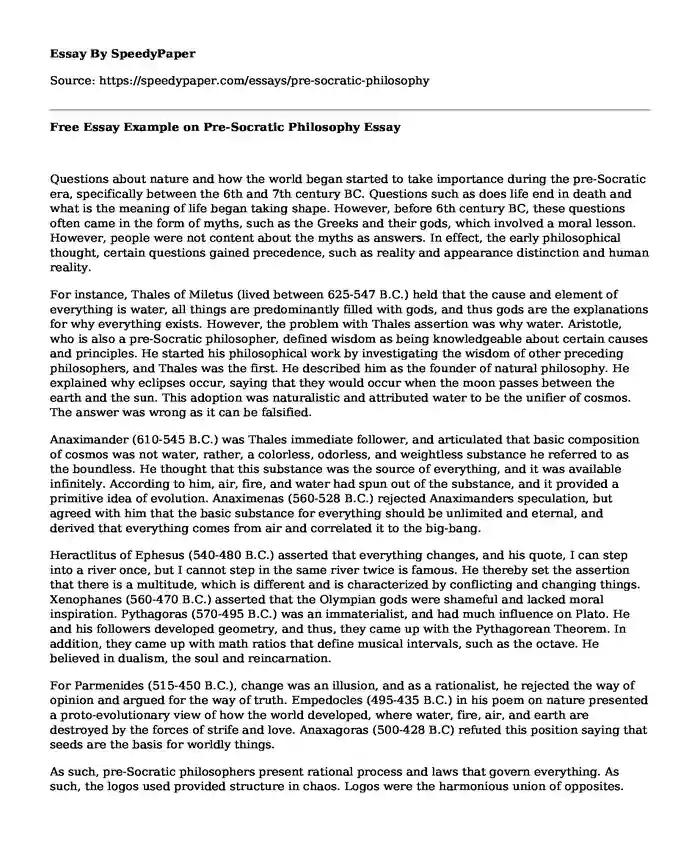
| Type of paper: | Essay |
| Categories: | Philosophy Philosophers |
| Pages: | 3 |
| Wordcount: | 605 words |
Questions about nature and how the world began started to take importance during the pre-Socratic era, specifically between the 6th and 7th century BC. Questions such as does life end in death and what is the meaning of life began taking shape. However, before 6th century BC, these questions often came in the form of myths, such as the Greeks and their gods, which involved a moral lesson. However, people were not content about the myths as answers. In effect, the early philosophical thought, certain questions gained precedence, such as reality and appearance distinction and human reality.
For instance, Thales of Miletus (lived between 625-547 B.C.) held that the cause and element of everything is water, all things are predominantly filled with gods, and thus gods are the explanations for why everything exists. However, the problem with Thales assertion was why water. Aristotle, who is also a pre-Socratic philosopher, defined wisdom as being knowledgeable about certain causes and principles. He started his philosophical work by investigating the wisdom of other preceding philosophers, and Thales was the first. He described him as the founder of natural philosophy. He explained why eclipses occur, saying that they would occur when the moon passes between the earth and the sun. This adoption was naturalistic and attributed water to be the unifier of cosmos. The answer was wrong as it can be falsified.
Anaximander (610-545 B.C.) was Thales immediate follower, and articulated that basic composition of cosmos was not water, rather, a colorless, odorless, and weightless substance he referred to as the boundless. He thought that this substance was the source of everything, and it was available infinitely. According to him, air, fire, and water had spun out of the substance, and it provided a primitive idea of evolution. Anaximenas (560-528 B.C.) rejected Anaximanders speculation, but agreed with him that the basic substance for everything should be unlimited and eternal, and derived that everything comes from air and correlated it to the big-bang.
Heractlitus of Ephesus (540-480 B.C.) asserted that everything changes, and his quote, I can step into a river once, but I cannot step in the same river twice is famous. He thereby set the assertion that there is a multitude, which is different and is characterized by conflicting and changing things. Xenophanes (560-470 B.C.) asserted that the Olympian gods were shameful and lacked moral inspiration. Pythagoras (570-495 B.C.) was an immaterialist, and had much influence on Plato. He and his followers developed geometry, and thus, they came up with the Pythagorean Theorem. In addition, they came up with math ratios that define musical intervals, such as the octave. He believed in dualism, the soul and reincarnation.
For Parmenides (515-450 B.C.), change was an illusion, and as a rationalist, he rejected the way of opinion and argued for the way of truth. Empedocles (495-435 B.C.) in his poem on nature presented a proto-evolutionary view of how the world developed, where water, fire, air, and earth are destroyed by the forces of strife and love. Anaxagoras (500-428 B.C) refuted this position saying that seeds are the basis for worldly things.
As such, pre-Socratic philosophers present rational process and laws that govern everything. As such, the logos used provided structure in chaos. Logos were the harmonious union of opposites. They revealed that a divine worldly order will guarantee the balance of opposites. However, Kants philosophy was based on good decision-making based on moral impact of ones actions. Socratess philosophy is based on problem-solving, where a person should ask questions about a problem, and when a solution arises, documentation is necessary.
Cite this page
Free Essay Example on Pre-Socratic Philosophy. (2019, Oct 08). Retrieved from https://speedypaper.com/essays/pre-socratic-philosophy
Request Removal
If you are the original author of this essay and no longer wish to have it published on the SpeedyPaper website, please click below to request its removal:
- Essay Example on Equal Access and Opportunity for Higher Education
- Free Essay Example on Visual Argument
- Scholarship Essay Example: How the Scholarship Will Assist Me
- Philosophy Essay Example: Indirect Realism and George Berkley's Idealism
- Psychology Essay Example: Attachment and Systems Perspective on Loss
- Essay Sample: Usefulness of Group Dynamics to Modern Organizations Leaders
- Essay Example on an Ideal Classroom in an Ideal School
Popular categories




